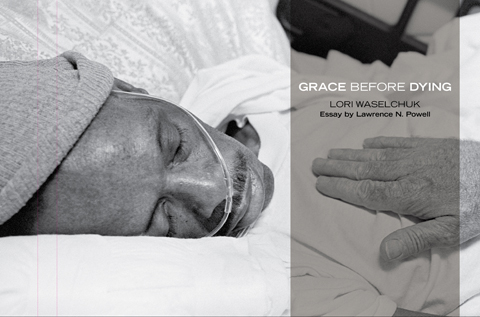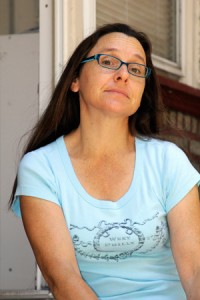Most of the prisoners incarcerated at the maximum security Louisiana State Penitentiary, commonly known as “Angola,” will die there. Some 70 percent of its more than 5,000 prisoners are serving life without the chance of parole. It’s a place renowned for violence and misery. But West Philly-based photographer Lori Waselchuk found behind its walls the very essence of humanity.
Waselchuk spent three years from 2007-2010 photographing inmates who took part in the prison’s hospice program. She watched men, many of whom were sent to prison for taking a life, help each other confront their own mortality.
“It was watching these men take a courageous step toward compassion and expressing their love for another person,” Waselchuk said while sitting outside her home on South Melville Street near Baltimore Avenue where she lives with her husband, Temple University professor Shenid Bhayroo, daughter Mira and son Zahli.
Waselchuk’s work at Angola has been collected in the book Grace Before Dying, just released this summer from Umbrage. Dozens of black-and-white photographs document men, some of whom have know each other for decades, helping each other die with dignity. The book includes an essay by Tulane University professor Lawrence N. Powell on Angola’s place in Louisiana history.
A memory still vivid in Waselchuk’s mind is inmates massaging the hands and feet of their mentor from the prison carpentry shop as he lay dying of lung and liver cancer. She writes in the book’s preface:
“The physical contact between these men was new territory for all involved … It was a profound moment of grace, during which these men allowed themselves to break physical boundaries and accept physical expressions of friendship.”
Waselchuk also documented a group of inmates that makes quilts for each hospice patient, another expression of love that seems so paradoxical in a place like Angola.
The project grew out of a small magazine assignment for a Louisiana publication to photograph the hospice program. Waselchuk soon realized that what she was witnessing and photographing needed deeper exploration. She made several trips to Angola over the three years she worked on the project. And although the photographs are of a place a thousand miles from West Philly, their subject is universal.
“This has always been a statement on humanity and what’s possible in all of us,” said Waselchuk, whose work has appeared in Newsweek, The New York Times and the Los Angeles Times.
The hardcover book is available through the publisher for $39.95. But Waselchuk is offering a special deal for her neighbors: if you’re in West Philly she will sign the book and hand deliver it you. Write her at lori [at] loriwaselchukphotos.com.
This project is more than a book. Waselchuk’s photographs and the prison quilts are part of a traveling exhibit, which will be at Saint Joseph’s University in the fall. A scaled down version will be at the A-Space (4722 Baltimore Ave.) for one night in the future as well in a joint program with the West Philly-based organization Books Through Bars. We will have more details on both of those exhibitions later.
Waselchuk’s next project is on block captains in Philadelphia, a subject she became interested in while walking the city’s neighborhoods as a Census taker last year. She is looking to get in touch with block captains in the city. Write her at the above e-mail address.










Recent Comments